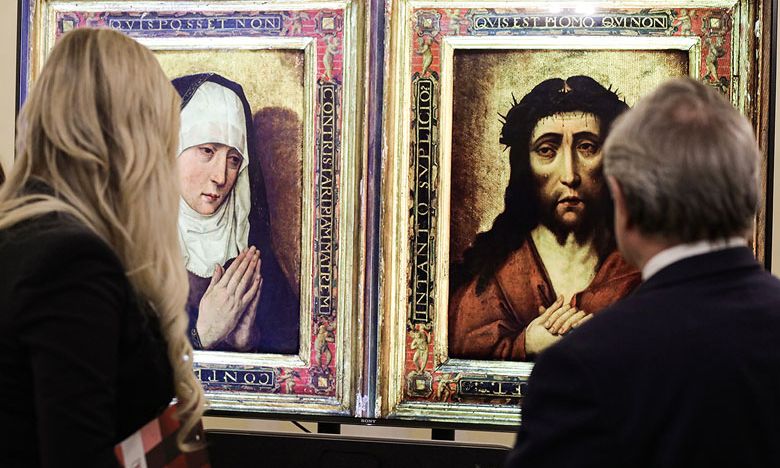The diptych from the workshop of Dieric Bouts Photo: Danuta Matloch
Two paintings stolen during the Second World War have been returned to Poland from Spain, the Polish Ministry of Culture announced this week. Mater Dolorosa and Ecce Homo, a diptych from the workshop of the Flemish master Dieric Bouts, were officially transferred from the Museo Provincial de Pontevedra in northwest Spain to Gołuchów Castle, a branch of the National Museum in Poznań, in the west of Poland.
Piotr Gliński, the Polish deputy prime minister and minister of culture, national heritage and sport, was present at the handover. “Another war loss returns to Poland. This is an example of how efficiently our lost art recovery system work,” Gliński said.
The two paintings, which depict the Virgin Mary and Christ, comprise a single work, that initially came into Polish possession in 1883, bought by Izabella Działyńska, who was part of the noble Czartoryski family.
Mater Dolorosa, from the workshop of Dieric Bouts, being inspected Photo: Museo Provincial de Pontevedra in Spain
During the Second World War, after it was invaded by both Nazi Germany and the Soviet Union, it is estimated that Poland may have lost more than half a million works of art. The returned works were most likely stolen from the National Museum in Warsaw during 1944’s Warsaw Uprising, according to the Polish Ministry of Culture. In 2019, employees of the Department of Restitution of Cultural Property identified the two works in the collection of the Pontevedra museum.
Restoration of looted art is a burning political issue in Poland. The television host and art historian Magdalena Ogórek has recently announced that she is to set up a Museum of Stolen Art in Lower Silesia, which will feature a permanent exhibit about how an estimated $30bn worth of art was stolen by Germany during the Second World War.
The aim of the museum is to show “the mechanism of the theft of Polish cultural property and the destruction of the cultural fabric of the Polish nation by the German occupant,” Ogórek told the Polish website The First News. “The majority of the exhibits will come from my private collections,” she added.
The Polish Culture Ministry also partnered with Unesco to host three days of workshops in Warsaw last week aiming to train law enforcement and other officials in how to prevent the trafficking of looted cultural objects from Ukraine. The agency aims to inform the public that Ukrainian art could end up on Europe’s art markets. Unesco’s director of culture and emergencies, Krista Pikkat, told the Associated Press: “Poland is really a country at the forefront of this work.”

